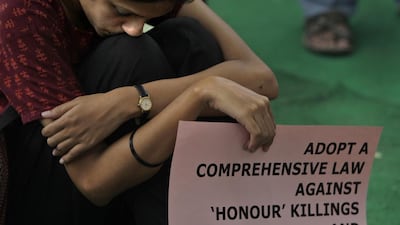MUMBAI // Calls are mounting for a law to be introduced specifically against so-called “honour killings” in India as data has emerged showing they surged by a staggering 800 per cent in a year.
Figures quoted in the Indian parliament revealed police registered 251 crimes as honour killings in 2015, compared to 28 in 2014 — the first year in which the government began recording honour killings as distinct from murder. Before January 2014, they were not collated separately.
The victims of such crimes are mostly women and the perpetrators often members of their own family. Activists point to a strong link with India’s caste system, which forbids intermarriage between people from different castes or religions.
“Honour killings are basically to do with the violation of these caste norms. The people who violate those norms become the target of all kinds of social ostracisation, and sometimes even killing takes place,” said Ranjana Kumari, the director of the Centre of Social Research, a non-profit organisation based in New Delhi.
She has been lobbying for a specific law recognising honour killings as illegal and subject to the same penalties as murder — capital punishment or life imprisonment. The spur to her campaign was the 2007 case involving newly-weds Manoj and Babli Banwala in Haryana, who were killed by Babli’s relatives because they believed the marriage went against clan tradition. Manoj was strangled by her grandfather while her brother forced Babli to consume pesticides.
Such cases are treated as murder now, if they are reported — which the vast majority are not.
Despite many calls for a new law, legislation has been delayed because traditional communities are a vital vote bank for politicians, she said.
“I’m sure we will have a law eventually where people at least can go for some recourse,” said Ms Kumari. ““Slowly, slowly it has become an issue. They have started recording it, the figures started coming from all over the country and you see the data has really swelled.”
/
As well going unrecorded, some suspicious deaths are passed off as suicides or accidents.
For example, in July in Bhopal, a couple was accused of murdering their 17-year-old daughter, Arti, because she was in a relationship they objected to. Arti’s mother and father forced her to write a suicide note before pouring kerosene over her and setting her alight. Her death was treated as suicide until police got hold of a video which showed the parents standing by doing nothing when the girl ran out of the house, engulfed in flames.
Many communities in India still accept killing as justifiable in what is perceived as defence of the family name.
“A new law is at least the first step in accepting that honour killings exist,” said Vandana Shah, a lawyer based in Mumbai. “Before the law on dowry was introduced about ten years ago, people pretended dowry didn’t exist, but everybody knew it did. Everyone in the village will know about an honour killing but nobody will come out and say that they are witness to the killing, A law would mean that people know it is legally wrong and you have recourse to some kind of justice.”
Honour killings happen especially frequently in Haryana and Uttar Pradesh in north India. The highest number of cases were in Uttar Pradesh, with 131 murders of this kind recorded last year.
A Kathir is the executive director of Evidence, an NGO in Tamil Nadu, south India, which campaigns for human rights. He too cites “vote bank issues” as the obstacle to progress on legislation.
He said that in many instances in Tamil Nadu, the body is burned after the killing, and the family reports the death as suicide. “Because the killings are by family members, it is hard to get witnesses,” he said.
In her campaign for change, Ms Kumari targets the forces that are propagating the murders. She says that she has staged protests at local committee meetings in rural areas, where rich farmers and elders control the local population and make the decisions about punishment inter caste marriages at meetings and in some cases decree that murder is the solution to the perceived problem. The committees are always made up entirely of men.
“The supreme court of India has said that these panchayats, or village councils, are extra-constitutional and unelected and have no right to issue these decisions, so governments have been asked to stop the functioning of these kinds of panchayats.
“This is caste and patriarchy working together,” she added. “We should not even call them honour killings because then you’re giving them some kind of justification. They are murders.”
foreign.desk@thenational.aes

